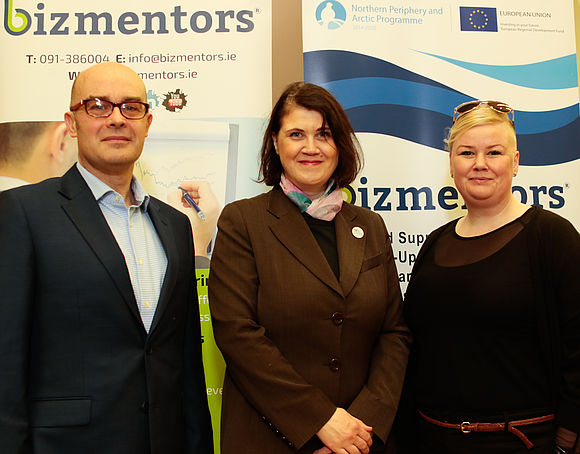BizMentors International (BM) is a three-year (2018-2021), transnational project co-funded by the EU Interreg Northern Periphery and Arctic Programme (NPA)[1] with a total budget in the region of €1.3m. It is aimed at supporting SME growth in the NPA region through accessible, open access, tailored mentoring for businesses. The development of such a transnational model is the BM project main deliverable. Such a model is complimentary to existing national mentoring models and is intended to facilitate mentoring for even the most peripheral SME’s in the region.
BizMentors International will be operated by six partner organisations across four European regions: Western Development Commission (WDC) and SCCUL Enterprises (Ireland), Savonia University of Applied Sciences (Finland), Northeast Iceland Development Agency and the Icelandic Arctic Cooperation Network (Iceland) and the Fermanagh and Omagh District Council (Northern Ireland).


About the Project
Project Objectives: Provide an online barrier-free, brokered access to business expertise across dispersed communities in the project partner regions Provide community-based peer to peer mentoring support to entrepreneurs and businesses in the Agri-Food sector that is structured, free, managed centrally online and transferable across other sectors Develop a sustainable and transferrable toolkit and Best Practice Handbook (BPH) to complement existing models and policy frameworks in the partner regions for diversification and growth of businesses in the Agri-Food sector Project activities will include: Developing & piloting a mentoring model which will suit each region participating in the project, and ensure its transferability to other business sectors, and other countries (not just in the NPA region), and focusing on a specific business sector (processing/refinement of natural resources) in the partner countries. An interactive, accessible, inclusive platform for all businesses will be developed, which will compliment and supplement existing mentoring support offerings. To support this, a transnational best practice business model handbook will be developed that can be used to address challenges in different countries.
